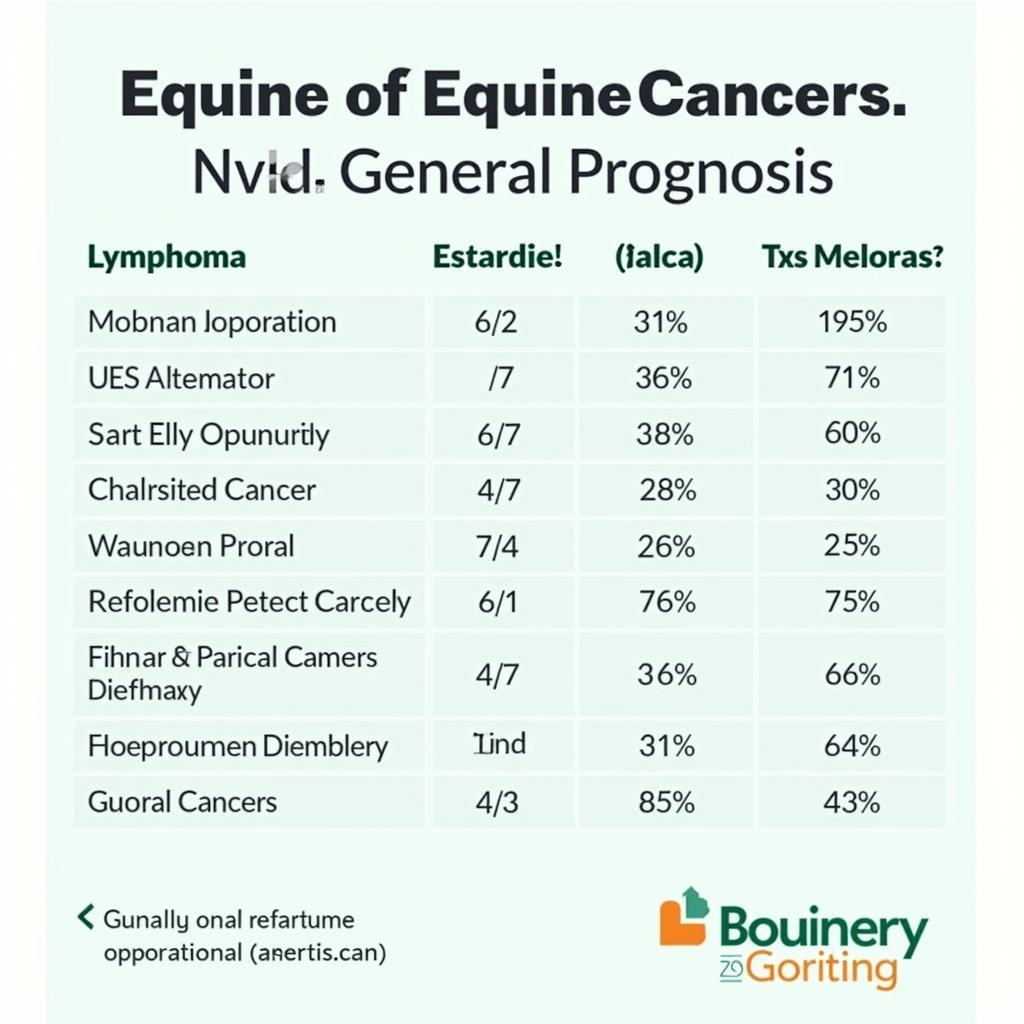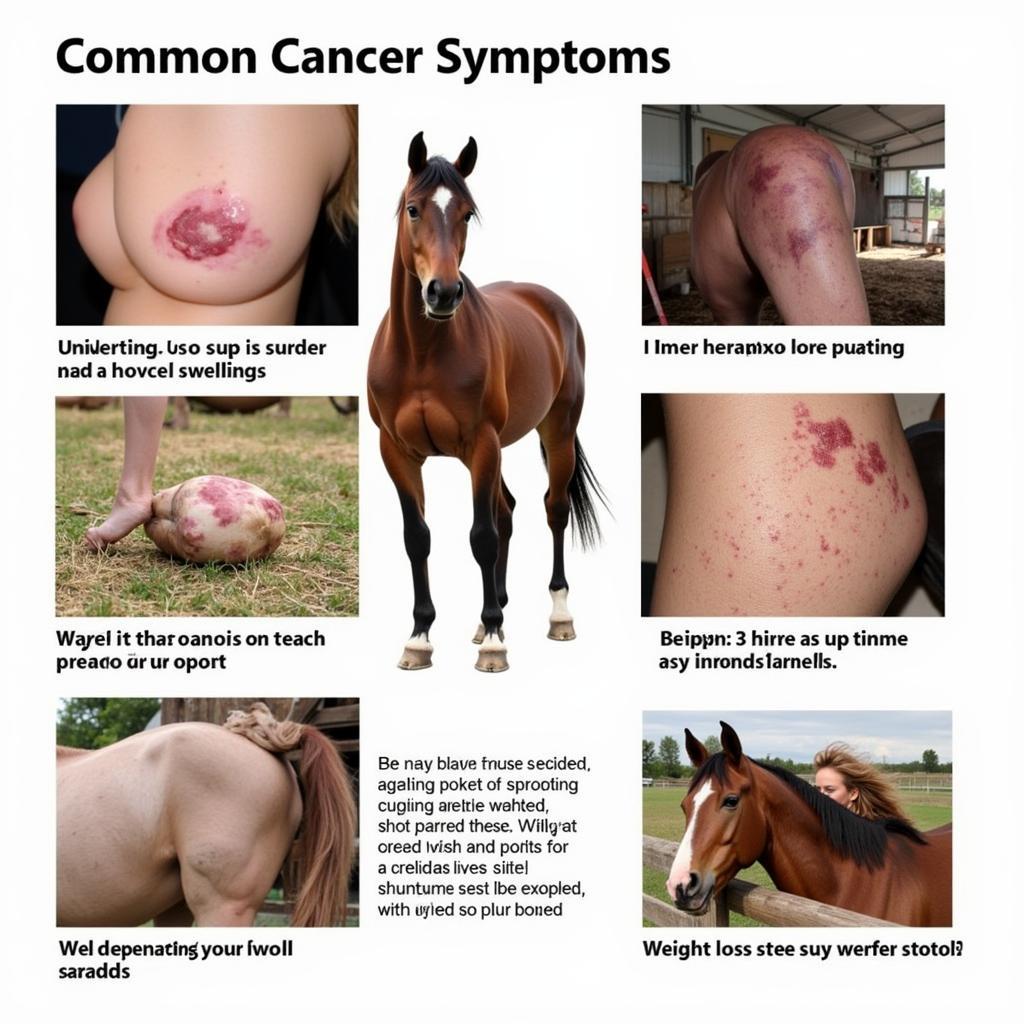Understanding how long a horse can live with cancer is a complex question with no easy answer. It depends on a multitude of factors, including the type of cancer, the stage of diagnosis, the horse’s overall health, and the chosen treatment options. Just like in humans, every case is unique.
Factors Influencing a Horse’s Lifespan with Cancer
Several factors play a crucial role in determining a horse’s prognosis after a cancer diagnosis. The specific type of cancer is paramount. Some cancers are more aggressive than others, impacting how quickly they spread and respond to treatment.  Horse Cancer Types and Prognosis For example, lymphoma in horses often progresses rapidly, while squamous cell carcinoma might have a slower growth rate. The stage at which cancer is detected is also critical. Early diagnosis often allows for more treatment options and potentially a longer lifespan. A horse’s age, general health, and pre-existing conditions also influence its ability to cope with cancer and its related treatments. A younger, healthier horse might have a better chance of fighting the disease than an older horse with compromised health. Finally, the chosen treatment strategy, whether it be surgery, chemotherapy, radiation, or palliative care, directly impacts the horse’s lifespan and quality of life.
Horse Cancer Types and Prognosis For example, lymphoma in horses often progresses rapidly, while squamous cell carcinoma might have a slower growth rate. The stage at which cancer is detected is also critical. Early diagnosis often allows for more treatment options and potentially a longer lifespan. A horse’s age, general health, and pre-existing conditions also influence its ability to cope with cancer and its related treatments. A younger, healthier horse might have a better chance of fighting the disease than an older horse with compromised health. Finally, the chosen treatment strategy, whether it be surgery, chemotherapy, radiation, or palliative care, directly impacts the horse’s lifespan and quality of life.
Types of Cancer in Horses and Their Prognosis
Equine cancers vary significantly, impacting their potential lifespan. Melanoma is a common skin cancer in gray horses. gray horses for sale While it can be managed for years, especially if caught early, it can become life-threatening if it spreads internally. Lymphosarcoma, affecting the lymphatic system, is often aggressive, and while treatments can induce remission, the long-term prognosis is guarded. Squamous cell carcinoma, typically found in the eye, genitals, and unpigmented skin, can be treated surgically if detected early, offering a better prognosis. Sarcoids, while technically not cancerous, are the most common skin tumors in horses. horse sarcoids pictures These tumors rarely spread but can be locally invasive, requiring various treatments.
What are the Signs of Cancer in Horses?
Recognizing the signs of cancer early can be vital for successful treatment. Unexplained weight loss, persistent sores that don’t heal, unusual swellings or lumps, changes in appetite, and lethargy are all potential warning signs. If you notice any of these symptoms, it’s crucial to consult your veterinarian for a prompt diagnosis.
 Common Cancer Symptoms in Horses
Common Cancer Symptoms in Horses
Treatment Options and Palliative Care
Depending on the type and stage of cancer, various treatment options exist, including surgery, chemotherapy, and radiation therapy. However, not all cancers are curable, and in some cases, the focus shifts to palliative care. This involves managing pain, improving quality of life, and providing supportive care to ensure the horse remains comfortable during its remaining time. how to treat protein bumps on horses
Can a Horse with Cancer Live a Normal Life?
In some cases, especially with early detection and effective treatment, horses with cancer can live relatively normal lives for a considerable time. This can involve adjustments to their diet, exercise routine, and overall management to accommodate their condition.
How Long Can a Horse with Cancer Live Without Treatment?
Without treatment, the lifespan of a horse with cancer varies significantly depending on the cancer type and its aggressiveness. Some cancers progress rapidly, leading to a shorter lifespan, while others might develop more slowly.
“Early detection is key. The sooner we diagnose and intervene, the better the chances of extending a horse’s life and maintaining its quality of life,” says Dr. Emily Carter, DVM, an equine oncologist with over 20 years of experience.
What to Expect When Your Horse Has Cancer
Facing a cancer diagnosis in your horse can be emotionally and financially challenging. Open communication with your veterinarian is essential. They can provide information about treatment options, prognosis, and potential costs, helping you make informed decisions that align with your horse’s best interests.
“It’s important to remember that each horse’s journey with cancer is unique,” adds Dr. Carter. “Focusing on providing the best possible care, comfort, and quality of life is paramount, regardless of the outcome.”
Conclusion
How long a horse can live with cancer remains a question with no definitive answer. gray andalusian horse Understanding the various factors influencing survival and working closely with your veterinary team is crucial for providing the best possible care and ensuring a comfortable life for your horse. black horse run raleigh Early detection and appropriate treatment are essential for maximizing both lifespan and quality of life.
FAQ
- What are the most common cancers in horses? (Melanoma, Lymphosarcoma, Squamous Cell Carcinoma, Sarcoids)
- What are the early signs of cancer in a horse? (Unexplained weight loss, non-healing sores, unusual swellings, changes in appetite, lethargy)
- What are the treatment options for equine cancer? (Surgery, chemotherapy, radiation therapy, palliative care)
- How much does cancer treatment for horses cost? (Varies widely depending on the type of cancer and treatment chosen)
- Can a horse with cancer be ridden? (Depends on the horse’s condition and the veterinarian’s recommendations)
- What is palliative care for horses? (Focuses on pain management and improving quality of life for horses with incurable diseases)
- How can I support my horse during cancer treatment? (Provide a comfortable environment, maintain a consistent routine, follow veterinary instructions carefully)
When you need assistance, please contact us at Phone Number: 0772127271, Email: [email protected] Or visit us at: QGM2+WX2, Vị Trung, Vị Thuỷ, Hậu Giang, Việt Nam. We have a 24/7 customer service team.